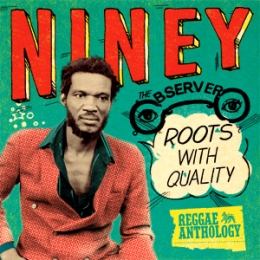Articles about reggae music, reviews, interviews, reports and more...
Roots with Quality by Niney the Observer

Roots with Quality by Niney the Observer
Essential compilation from the roots pioneer and master producer.
This double-CD collection from VP records is not the first Niney retrospective, but it is the most comprehensive compilation so far from the producer, writer and sometime vocalist referred to in the sleevenotes as “one of the most mysterious personalities in Jamaican music history”.
Winston ‘Niney’ Holness, born George Boswell, hails from Montego Bay and his career spans early work with Coxsone Dodd and, later, with Bunny Lee and Joe Gibbs. Widely recognised for some seminal roots tracks with Dennis Brown, and for some awesome dubs, this new release reminds us that Niney’s influence goes further.
 With forty tracks on two discs, the first CD begins with the legendary Blood and Fire, complete with Niney’s vocals. This is followed by Whole Lot of Fire, a restrained Big Youth treatment on the same rhythm, while The Coming of Jah brings Niney together with two giants of reggae, Max Romeo and Lee Perry, atop an insistent basic rhythm. Rasta Bandwagon, also with Lee Perry and Max Romeo, carries a message for the ‘imitation rasta man’ who expropriates the music without understanding its values.
With forty tracks on two discs, the first CD begins with the legendary Blood and Fire, complete with Niney’s vocals. This is followed by Whole Lot of Fire, a restrained Big Youth treatment on the same rhythm, while The Coming of Jah brings Niney together with two giants of reggae, Max Romeo and Lee Perry, atop an insistent basic rhythm. Rasta Bandwagon, also with Lee Perry and Max Romeo, carries a message for the ‘imitation rasta man’ who expropriates the music without understanding its values.
Then something special, the original of Guess Who’s Coming to Dinner, later to be recorded by Black Uhuru and also by Sly and Robbie. Here, honours go to Niney and Michael Rose, with the rhythm going straight into the Clap the Barber version. The excellent dub backing to Rock On by Gregory Isaacs demonstrates Niney’s skills in the control room, while Here I Come by Dennis Brown leads into Jah Come Here, a deejaying version from I Roy on top form.
The second disc opens with Dennis Brown’s classic Wolf and Leopards. Recorded at Lee Perry’s Black Ark studio, it blends into Bongo Herman’s excellent percussive extended version. The extended version of No More Will I Roam from Dennis Brown includes Niney’s lengthy instrumental deconstruction of the song. Jacob Miller’s Moses is a short, sweet, uncomplicated and optimistic roots song.
The powerful opening chords of the Ethiopians’ Slave Call flow into a heartfelt song of pain and redemption, reminiscent of another time and another music. In sharp contrast, Roots with Quality by Third World dates from the early 80s, while Lover’s Rock JA Style, from Freddie McGregor, demonstrates how Niney’s productions had evolved to take account of musical changes and the emergence of dancehall in the 80s.
The collection closes in ragga style with Money Friend by Leroy Smart and Baby Wayne from the 1990s, demonstrating how far Niney’s music had developed over the decades. This compilation, with its rare tracks and encyclopaedic perspective on Niney’s career, will be required listening for the converted and a revelation to those who have yet to appreciate his influence.
Read more about this topic
Comments actually desactivated due to too much spams
Browse by categories
Recommended Articles
Latest articles
Recently addedView all
© 2007-2026 United Reggae. All Rights Reserved. Reproduction in whole or in part is prohibited. Read about copyright
Terms of use | About us | Contact us | Authors | Newsletter | A-Z














